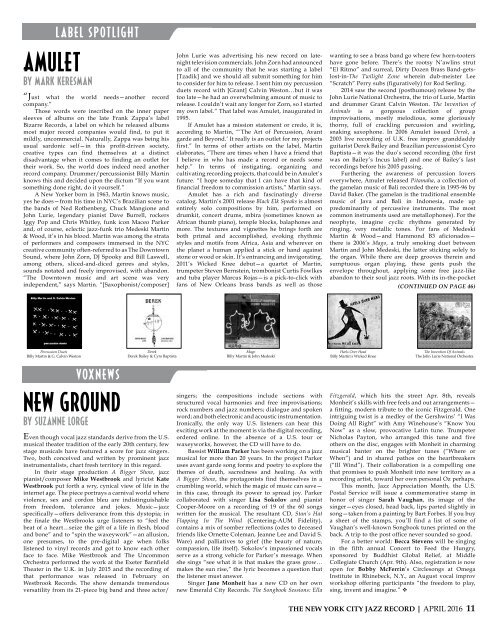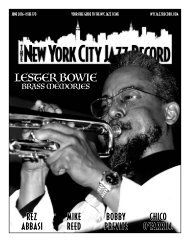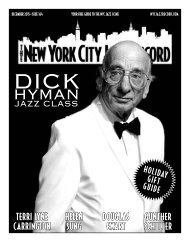You also want an ePaper? Increase the reach of your titles
YUMPU automatically turns print PDFs into web optimized ePapers that Google loves.
L A B E L S P OT L I G H T<br />
AMULET<br />
by mark keresman<br />
“Just what the world needs—another record<br />
company.”<br />
Those words were inscribed on the inner paper<br />
sleeves of albums on the late Frank Zappa’s label<br />
Bizarre Records, a label on which he released albums<br />
most major record companies would find, to put it<br />
mildly, uncommercial. Naturally, Zappa was being his<br />
usual sardonic self—in this profit-driven society,<br />
creative types can find themselves at a distinct<br />
disadvantage when it comes to finding an outlet for<br />
their work. So, the world does indeed need another<br />
record company. Drummer/percussionist Billy Martin<br />
knows this and decided upon the dictum “If you want<br />
something done right, do it yourself.”<br />
A New Yorker born in 1963, Martin knows music,<br />
yes he does—from his time in NYC’s Brazilian scene to<br />
the bands of Ned Rothenberg, Chuck Mangione and<br />
John Lurie, legendary pianist Dave Burrell, rockers<br />
Iggy Pop and Chris Whitley, funk icon Maceo Parker<br />
and, of course, eclectic jazz-funk trio Medeski Martin<br />
& Wood, it’s in his blood. Martin was among the strata<br />
of performers and composers immersed in the NYC<br />
creative community often-referred to as The Downtown<br />
Sound, where John Zorn, DJ Spooky and Bill Laswell,<br />
among others, sliced-and-diced genres and styles,<br />
sounds notated and freely improvised, with abandon.<br />
“The Downtown music and art scene was very<br />
independent,” says Martin. “[Saxophonist/composer]<br />
John Lurie was advertising his new record on latenight<br />
television commercials. John Zorn had announced<br />
to all of the community that he was starting a label<br />
[Tzadik] and we should all submit something for him<br />
to consider for him to release. I sent him my percussion<br />
duets record with [Grant] Calvin Weston…but it was<br />
too late—he had an overwhelming amount of music to<br />
release. I couldn’t wait any longer for Zorn, so I started<br />
my own label.” That label was Amulet, inaugurated in<br />
1995.<br />
If Amulet has a mission statement or credo, it is,<br />
according to Martin, “’The Art of Percussion, Avant<br />
garde and Beyond.’ It really is an outlet for my projects<br />
first.” In terms of other artists on the label, Martin<br />
elaborates, “There are times when I have a friend that<br />
I believe in who has made a record or needs some<br />
help.” In terms of instigating, organizing and<br />
cultivating recording projects, that could be in Amulet’s<br />
future. “I hope someday that I can have that kind of<br />
financial freedom to commission artists,” Martin says.<br />
Amulet has a rich and fascinatingly diverse<br />
catalog. Martin’s 2001 release Black Elk Speaks is almost<br />
entirely solo compositions by him, performed on<br />
drumkit, concert drums, mbira (sometimes known as<br />
African thumb piano), temple blocks, balaphones and<br />
more. The textures and vignettes he brings forth are<br />
both primal and accomplished, evoking rhythmic<br />
styles and motifs from Africa, Asia and wherever on<br />
the planet a human applied a stick or hand against<br />
stone or wood or skin. It’s entrancing and invigorating.<br />
2011’s Wicked Knee debut—a quartet of Martin,<br />
trumpeter Steven Bernstein, trombonist Curtis Fowlkes<br />
and tuba player Marcus Rojas—is a pick-to-click with<br />
fans of New Orleans brass bands as well as those<br />
wanting to see a brass band go where few horn-tooters<br />
have gone before. There’s the rootsy N’awlins strut<br />
“El Ritmo” and surreal, Dirty Dozen Brass Band-getslost-in-The<br />
Twilight Zone wherein dub-meister Lee<br />
“Scratch” Perry subs (figuratively) for Rod Serling.<br />
2014 saw the second (posthumous) release by the<br />
John Lurie National Orchestra, the trio of Lurie, Martin<br />
and drummer Grant Calvin Weston. The Invention of<br />
Animals is a gorgeous collection of group<br />
improvisations, mostly melodious, some gloriously<br />
thorny, full of crackling percussion and swirling,<br />
snaking saxophone. In 2006 Amulet issued Derek, a<br />
2003 live recording of U.K. free improv granddaddy<br />
guitarist Derek Bailey and Brazilian percussionist Cyro<br />
Baptista—it was the duo’s second recording (the first<br />
was on Bailey’s Incus label) and one of Bailey’s last<br />
recordings before his 2005 passing.<br />
Furthering the awareness of percussion lovers<br />
everywhere, Amulet released Pitamaha, a collection of<br />
the gamelan music of Bali recorded there in 1995-96 by<br />
David Baker. (The gamelan is the traditional ensemble<br />
music of Java and Bali in Indonesia, made up<br />
predominantly of percussive instruments. The most<br />
common instruments used are metallophones). For the<br />
neophyte, imagine cyclic rhythms generated by<br />
ringing, very metallic tones. For fans of Medeski<br />
Martin & Wood—and Hammond B3 aficionados—<br />
there is 2006’s Mago, a truly smoking duet between<br />
Martin and John Medeski, the latter sticking solely to<br />
the organ. While there are deep grooves therein and<br />
sumptuous organ playing, these gents push the<br />
envelope throughout, applying some free jazz-like<br />
abandon to their soul jazz roots. With its in-the-pocket<br />
(CONTINUED ON PAGE 46)<br />
Percussion Duets<br />
Billy Martin & G. Calvin Weston<br />
Derek<br />
Derek Bailey & Cyro Baptista<br />
Mago<br />
Billy Martin & John Medeski<br />
Heels Over Head<br />
Billy Martin’s Wicked Knee<br />
The Invention Of Animals<br />
The John Lurie National Orchestra<br />
VOX N EWS<br />
NEW GROUND<br />
by suzanne lorge<br />
Even though vocal jazz standards derive from the U.S.<br />
musical theater tradition of the early 20th century, few<br />
stage musicals have featured a score for jazz singers.<br />
Two, both conceived and written by prominent jazz<br />
instrumentalists, chart fresh territory in this regard.<br />
In their stage production A Bigger Show, jazz<br />
pianist/composer Mike Westbrook and lyricist Kate<br />
Westbrook put forth a wry, cynical view of life in the<br />
internet age. The piece portrays a carnival world where<br />
violence, sex and cordon bleu are indistinguishable<br />
from freedom, tolerance and jokes. Music—jazz<br />
specifically—offers deliverance from this dystopia; in<br />
the finale the Westbrooks urge listeners to “feel the<br />
beat of a heart…seize the gift of a life in flesh, blood<br />
and bone” and to “spin the waxeywork”—an allusion,<br />
one presumes, to the pre-digital age when folks<br />
listened to vinyl records and got to know each other<br />
face to face. Mike Westbrook and The Uncommon<br />
Orchestra performed the work at the Exeter Barnfield<br />
Theater in the U.K. in July 2015 and the recording of<br />
that performance was released in February on<br />
Westbrook Records. The show demands tremendous<br />
versatility from its 21-piece big band and three actor/<br />
singers; the compositions include sections with<br />
structured vocal harmonies and free improvisations;<br />
rock numbers and jazz numbers; dialogue and spoken<br />
word; and both electronic and acoustic instrumentation.<br />
Ironically, the only way U.S. listeners can hear this<br />
exciting work at the moment is via the digital recording,<br />
ordered online. In the absence of a U.S. tour or<br />
waxeyworks, however, the CD will have to do.<br />
Bassist William Parker has been working on a jazz<br />
musical for more than 20 years. In the project Parker<br />
uses avant garde song forms and poetry to explore the<br />
themes of death, sacredness and healing. As with<br />
A Bigger Show, the protagonists find themselves in a<br />
crumbling world, which the magic of music can save—<br />
in this case, through its power to spread joy. Parker<br />
collaborated with singer Lisa Sokolov and pianist<br />
Cooper-Moore on a recording of 19 of the 60 songs<br />
written for the musical. The resultant CD, Stan’s Hat<br />
Flapping In The Wind (Centering-AUM Fidelity),<br />
contains a mix of somber reflections (odes to deceased<br />
friends like Ornette Coleman, Jeanne Lee and David S.<br />
Ware) and palliatives to grief (the beauty of nature,<br />
compassion, life itself). Sokolov’s impassioned vocals<br />
serve as a strong vehicle for Parker’s message. When<br />
she sings “see what it is that makes the grass grow…<br />
makes the sun rise,” the lyric becomes a question that<br />
the listener must answer.<br />
Singer Jane Monheit has a new CD on her own<br />
new Emerald City Records. The Songbook Sessions: Ella<br />
Fitzgerald, which hits the street Apr. 8th, reveals<br />
Monheit’s skills with free feels and out arrangements—<br />
a fitting, modern tribute to the iconic Fitzgerald. One<br />
intriguing twist is a medley of the Gershwins’ “I Was<br />
Doing All Right” with Amy Winehouse’s “Know You<br />
Now” as a slow, provocative Latin tune. Trumpeter<br />
Nicholas Payton, who arranged this tune and five<br />
others on the disc, engages with Monheit in charming<br />
musical banter on the brighter tunes (“Where or<br />
When”) and in shared pathos on the heartbreakers<br />
(“Ill Wind”). Their collaboration is a compelling one<br />
that promises to push Monheit into new territory as a<br />
recording artist, toward her own personal Oz perhaps.<br />
This month, Jazz Appreciation Month, the U.S.<br />
Postal Service will issue a commemorative stamp in<br />
honor of singer Sarah Vaughan, its image of the<br />
singer—eyes closed, head back, lips parted slightly in<br />
song—taken from a painting by Bart Forbes. If you buy<br />
a sheet of the stamps, you’ll find a list of some of<br />
Vaughan’s well-known Songbook tunes printed on the<br />
back. A trip to the post office never sounded so good.<br />
For a better world: Becca Stevens will be singing<br />
in the fifth annual Concert to Feed the Hungry,<br />
sponsored by Buddhist Global Relief, at Middle<br />
Collegiate Church (Apr. 9th). Also, registration is now<br />
open for Bobby McFerrin’s Circlesongs at Omega<br />
Institute in Rhinebeck, N.Y., an August vocal improv<br />
workshop offering participants “the freedom to play,<br />
sing, invent and imagine.” v<br />
THE NEW YORK CITY JAZZ RECORD | APRIL 2016 11




